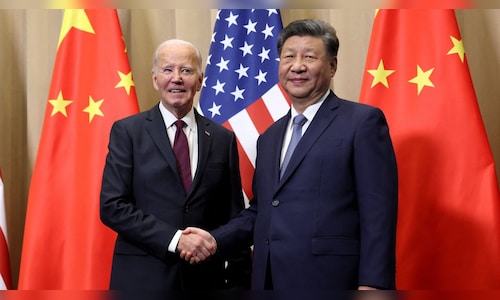[ad_1]
According to Chinese state media Xinhua, Xi reiterated that Taiwan, democracy, human rights, and development rights are “red lines” for China and must not be challenged. He warned against U.S. involvement in territorial disputes in the South China Sea or actions that might provoke instability in the region.
“When the two countries treat each other as partner and friend, seek common ground while shelving differences and help each other succeed, our relationship would make considerable progress,” Xi stated. “But if we take each other as rivals or adversary, pursue vicious competition, and seek to hurt each other, we would roil the relationship or even set it back.”
Also Read: G7 confirms pledge to impose severe costs on Russia for Ukraine war
Both leaders, however, found common ground on nuclear weapons and artificial intelligence. The White House confirmed that Biden and Xi agreed that decisions over the use of nuclear weapons must remain under human control. “The two leaders affirmed the need to maintain human control over the decision to use nuclear weapons,” the statement read. They also discussed the risks posed by AI in military applications.
While the dialogue marked the first joint acknowledgment of these challenges, it remains unclear whether it will result in further negotiations. Washington has been seeking nuclear arms talks with Beijing for months but has faced resistance. Semi-official exchanges resumed briefly in November but stalled soon after. The Pentagon estimates China has 500 operational nuclear warheads, with projections suggesting more than 1,000 by 2030, compared to the United States’ 1,770.
On Taiwan, tensions flared as Biden called for an end to Beijing’s “destabilising” military actions around the island. Xi countered by denouncing Taiwanese President Lai Ching-te’s activities as incompatible with peace, asserting Beijing’s territorial claims over the self-governing democracy. The issue of Taiwan remains one of the most contentious points in Sino-American relations, with the U.S. maintaining its position as Taiwan’s most significant backer despite the absence of formal diplomatic ties.
Also Read: Two flash bombs fired into garden of Netanyahu’s home in north Israel
Trade disputes also featured prominently in the dialogue, with Xi voicing opposition to Biden’s tariffs on Chinese goods and restrictions on U.S. investments in key sectors like AI and semiconductors. Meanwhile, Biden defended these measures as essential to safeguarding U.S. national security.
As Donald Trump prepares to assume office in January, Xi said that the goal of a healthy China-US relationship will remain the same. “China’s goal of a stable, healthy, and sustainable China-U.S. relationship remains unchanged,” Xi said.
Xi’s diplomatic outreach continues with a week-long tour of Latin America. The APEC summit served as a platform for Beijing to announce major initiatives, including hosting the summit in 2026 and expanding its free-trade agreement with Peru.
Also Read: Over 1,400 antiquities valued $10 million returned to India by US
[ad_2]
Source link










